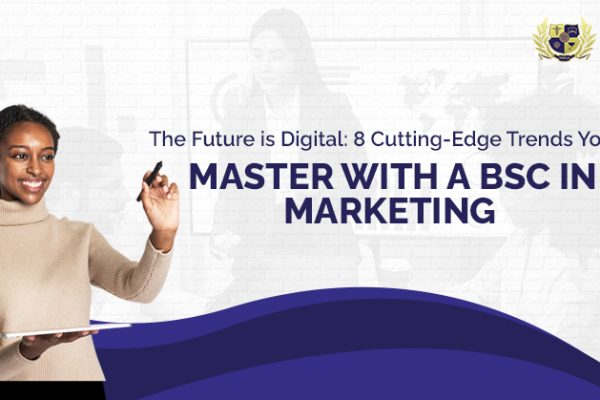|
Tired of Reading? Please listen to the blog
|
Blog Summary
A marketing degree is a gateway to diverse opportunities, seamlessly guiding graduates from classrooms to boardrooms. Beyond providing a deep understanding of consumer behaviour and strategic planning, it hones versatile skills crucial for business success. The curriculum emphasizes staying abreast of market trends, enabling professionals to navigate industry shifts adeptly. Communication skills are sharpened for crafting compelling brand narratives, while strategic thinking becomes second nature in addressing product positioning and market segmentation. The degree fosters creativity for innovative problem-solving and ensures proficiency in data analytics and technology integration, keeping graduates ahead in the digital age. These benefits position marketing graduates as indispensable assets in the corporate world, poised to drive success and innovation.
Introduction
Embarking on the educational journey towards a marketing degree goes beyond the confines of the classroom; it sets the stage for a dynamic career path that extends into the highest echelons of corporate leadership. In this blog, we will explore five benefits that graduates with a marketing degree bring from the classroom to the boardroom, shaping their success in the professional realm.
1. Strategic Thinking and Problem-Solving Skills
Market Analysis and Strategic Planning
A hallmark of a marketing degree lies in cultivating strategic thinking and problem-solving skills, emphasizing market analysis and strategic planning. As students delve into market analysis, they gain a profound understanding of consumer behaviour, industry trends, and competitive landscapes. With this knowledge, graduates can adeptly identify opportunities and potential challenges within the market. Strategic planning becomes second nature as they formulate comprehensive plans aligning with organizational goals.
Market Analysis involves assessing market dynamics, customer preferences, and competitive forces. This skill set enables marketers to make informed decisions and anticipate shifts in consumer behaviour. Concurrently, Strategic Planning focuses on translating market insights into actionable plans, positioning businesses to capitalize on opportunities and mitigate risks. The boardroom benefits significantly from individuals who possess these skills, as their strategic insight contributes to informed decision-making and long-term business success.
Mentorship and Creative Problem-Solving in Marketing Campaigns
Mentorship plays a pivotal role in honing strategic thinking. A Bachelors Degree in Marketing often facilitates mentorship opportunities where students can learn from seasoned professionals. This mentorship fosters a practical application of strategic skills, offering insights into real-world scenarios and the dynamic nature of marketing.
In Creative Problem-Solving in Marketing Campaigns, graduates can navigate challenges in devising impactful campaigns. They learn to tailor solutions to target audience preferences, analyze competitive landscapes, and incorporate emerging industry trends. This creative problem-solving ability becomes invaluable in the boardroom, where innovation is paramount for overcoming business obstacles. Whether developing new products or revitalizing brand images, marketing graduates bring a unique blend of strategic thinking and creative problem-solving that elevates discussions and shapes the company’s trajectory.

2. Effective Communication and Presentation Abilities
Crafting Compelling Messages
In the dynamic field of Marketing Degree Courses, the emphasis on effective communication is a cornerstone of degree programs. Graduates emerge with a finely honed skill set, particularly in crafting compelling messages that resonate across diverse audiences. This proficiency extends seamlessly from the classroom to the boardroom, where clear communication becomes paramount. In the professional realm, marketers adept at shaping impactful messages play a pivotal role in aligning teams, presenting strategies, and making crucial decisions. The ability to distil complex ideas into clear, resonant messages is a critical asset that enhances collaboration and understanding in the corporate environment.
Persuasive Presentation Techniques
An integral component of marketing education is the art of persuasive presentation. Graduates, well-versed in this skill, bring to the boardroom the ability to captivate audiences and present ideas persuasively. This proficiency holds immense significance in leadership roles and decision-making processes. Whether outlining strategic plans, pitching campaigns, or proposing innovative initiatives, marketers with a background in persuasive presentation techniques wield influence over stakeholders. This subsection underscores the pivotal role presentation skills play in conveying information, shaping perceptions, garnering support, and creating and nurturing a common goal among various stakeholders involved in the corporate environment. Effective communication and persuasive presentation techniques thus emerge as linchpins in the journey from the classroom to the boardroom for marketing degree holders.
3. Market Research Expertise for Informed Decision-Making
In the dynamic business realm, the BS Marketing Degree Program equips graduates with a profound skill set, prominently featuring expertise in market research. Encapsulated by the twin pillars of Gathering and Analyzing Market Data and Consumer Behavior Insights, this proficiency becomes a linchpin in driving informed decision-making within the corporate echelons.
Gathering and Analyzing Market Data
Marketing education’s heart is the ability to collect and dissect market data precisely. Graduates adept in this art bring a valuable asset to the boardroom, where strategic decisions hinge on accurate information. These professionals foster a data-driven culture by meticulously gathering data on market trends, competitor strategies, and consumer sentiments. It not only aids in identifying opportunities but also mitigates risks, ensuring the company navigates the competitive landscape with sagacity. The boardroom transforms into a hub of strategic planning, where marketing graduates play a pivotal role in steering the company towards success through well-informed choices.
Consumer Behavior Insights
Understanding consumer behaviour is a cornerstone of marketing education, and graduates bring this insight to the forefront in the boardroom. Armed with a deep comprehension of consumer preferences, trends, and buying patterns, they become influential architects in product development strategies. Moreover, their expertise permeates branding decisions, aligning the company’s image with the desires of its target audience. In the boardroom, marketing graduates become catalysts for innovation, steering the business in a direction harmonious with the dynamic expectations of the consumer landscape.
4. Brand Management and Reputation Building
Cultivating a Strong Brand Presence
In the dynamic landscape of modern business, a marketing degree proves instrumental in instilling the art and science of cultivating a robust brand presence. Graduates emerge well-versed in the intricacies of brand management, comprehending that a brand is more than just a logo—it is an evolving narrative that requires careful crafting and nurturing. Within marketing programs, emphasis is placed on strategies that resonate with the target audience, fostering consistency across diverse platforms. Armed with this expertise, graduates enter the boardroom equipped to shape and reinforce the company’s image. They understand the significance of aligning brand messages with the core values and aspirations of the organization, ensuring that every interaction leaves an impression.
Mitigating Risks to Corporate Reputation
One of the critical pillars in marketing education is the proactive approach to risk management, particularly in safeguarding corporate reputation. Marketing bachelor’s degree holders are adept at identifying potential risks that could tarnish a company’s image. It includes understanding the nuances of crisis communication and developing strategies for effective mitigation. These skills become paramount in the boardroom, where discussions often concern protecting the brand from reputational harm. Graduates bring a strategic mindset to these discussions, offering insights into preemptive measures and rapid response plans. In a world where reputations can be fragile, marketing professionals are pivotal in steering companies away from potential pitfalls and maintaining a positive corporate image.

5. Adaptability in the Digital Age
In an era of rapid technological evolution, a Degree in Marketing is a pivotal benefit that in cultivating adaptability among graduates. Graduates of marketing degree programs can now be well-equipped with digital marketing strategies, enabling them to navigate the digital landscape expertly.
Digital Marketing Strategies
Central to this adaptability is the mastery of digital marketing strategies. Marketing graduates are equipped with a profound understanding of social media management, content marketing, and data analytics. This multifaceted skill set positions them as valuable assets in the boardroom, steering discussions on digital transformation and fortifying their online presence. The ability to decipher and leverage digital platforms becomes a competitive advantage, reflecting the graduate’s capacity to align marketing efforts with contemporary consumer behaviours.
Tech-Savvy Marketing Professionals
The inherent tech-savvy nature of marketing graduates augments their contribution to boardroom deliberations. Rooted in a foundation of digital technologies, these professionals bring a fresh and informed perspective to discussions on technological advancements. Their insights extend beyond conventional marketing approaches, fostering dialogues on the indispensable role of innovation in propelling business growth. The intersection of marketing expertise with technological acumen positions these graduates as catalysts for forward-thinking strategies in an ever-evolving digital landscape, reinforcing the invaluable adaptability instilled by a marketing degree.
Conclusion
In conclusion, the benefits of a marketing degree extend far beyond the classroom, positioning graduates as dynamic and strategic leaders in the boardroom. From strategic thinking and effective communication to market research expertise, brand management, and adaptability in the digital age, marketing professionals bring a unique skill set that influences decision-making, shapes corporate strategies, and propels businesses toward success. As companies navigate the complexities of a rapidly evolving business landscape, the versatile expertise of marketing graduates proves instrumental in driving innovation and maintaining a competitive edge.











